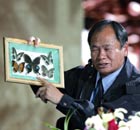Government and Policy
Wen signals political restructuring
(Xinhua)
Updated: 2010-03-06 10:41
 |
Large Medium Small |
BEIJING:China's modernization drive and economic reform could risk a failure without political restructuring as the nation's ongoing reforms were across-the-board, said Premier Wen Jiabao on Friday.
Wen, while delivering a government work report to the annual parliament session, said that the government would create conditions for the people to criticize and supervise the government, and let news media fully play their oversight role so as to put the authorities under sunlight.
These remarks have won applause from more than 5,000 legislators and political advisors who gathered in the Great Hall of the People to hear and discuss the government work report.
Observers took the remarks as a significant signal for the nation to advance political restructuring.
Professor Wang Wei with the Politics School of the Chinese Academy of Governance said Wen's statement reflected the central government's confidence although the nation faced a complex internal and external environment.
"It's good to see the government alert to the challenges ahead, and pay more attention to its problems than its past merits even though it has taken lead to walk out of the shadow of the global financial crisis," Wang said.
The Chinese political system has exhibited its cutting edges in mobilizing social resources to tackle overwhelming slowdown. Many developed countries, by contrast, were slow to respond as their decision-making process took more time, said Wang.
"If the government gets carried away by achievements and thinks the system unparalleled, the nation will be thrown into danger, as the nation can hardly sustain its economic prosperity if political restructuring trails," he said.
Lawmaker Yu Pei, chief of the World History Studies of the Chinese Academy of Social Sciences, said that advancing political restructuring would help China better address its thorny domestic concern and close the ties between the government and the people.
"If China wants to seek a bigger role in the global arena, it must grow stronger and have its economic and social problems well addressed first," said Yu.
In this work report to the National People's Congress (NPC), the country's parliament, Wen admitted the government's work still "fell considerably short of public expectations."
Wen also admitted that the transformation of government functions is incomplete and there is too much government interference in the micro-economy, and public administration and services are relatively weak.
He said efforts should be made to focus on transforming government functions, deepening reform of the administrative system and working hard to make the government devoted to service.
Wen said the government will earnestly deal with serious infringements on public interests related to enterprises' conversion to a stockholding system, land expropriation, housing demolition and resident relocation, environmental protection, labor disputes, and legal and litigation issues.
It will also improve handling of public complaints, he said.
Wen vowed to develop socialist democracy and effectively safeguard the democratic rights of people as "masters of the country."
He also said China will further expand primary-level democracy and strengthen primary-level self-governing bodies so that people can better participate in the management of local affairs.
The legislature is to amend the Electoral Law, adopted in 1953, during the session. The amendment aims at ensuring equal electoral rights between urban and rural residents.







